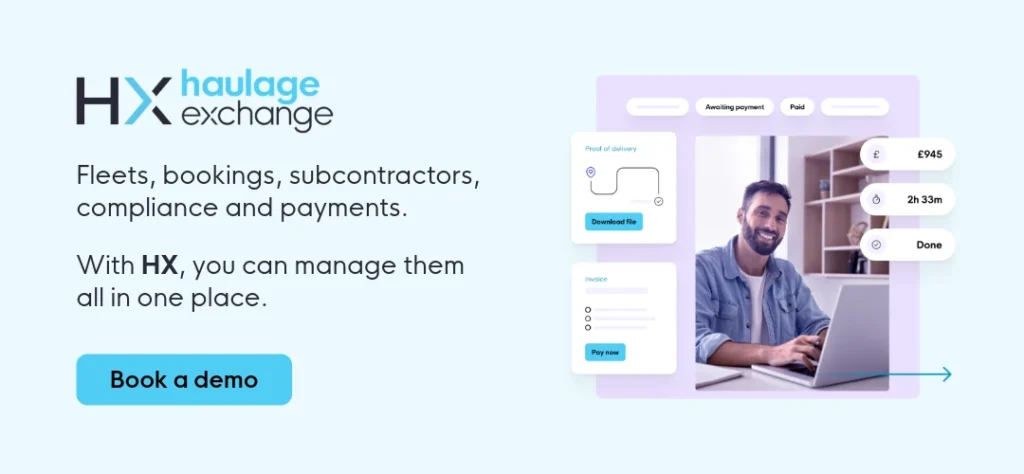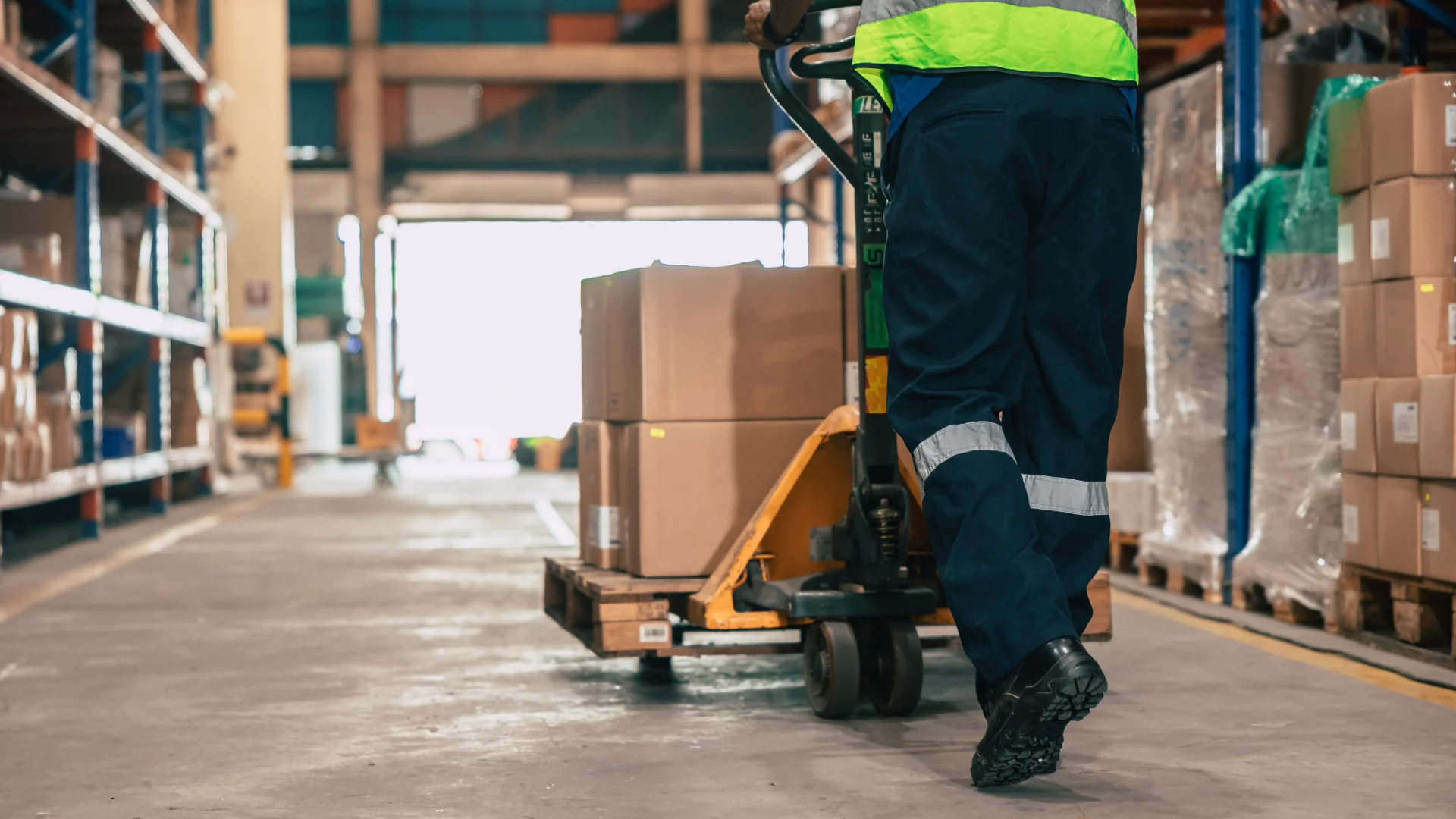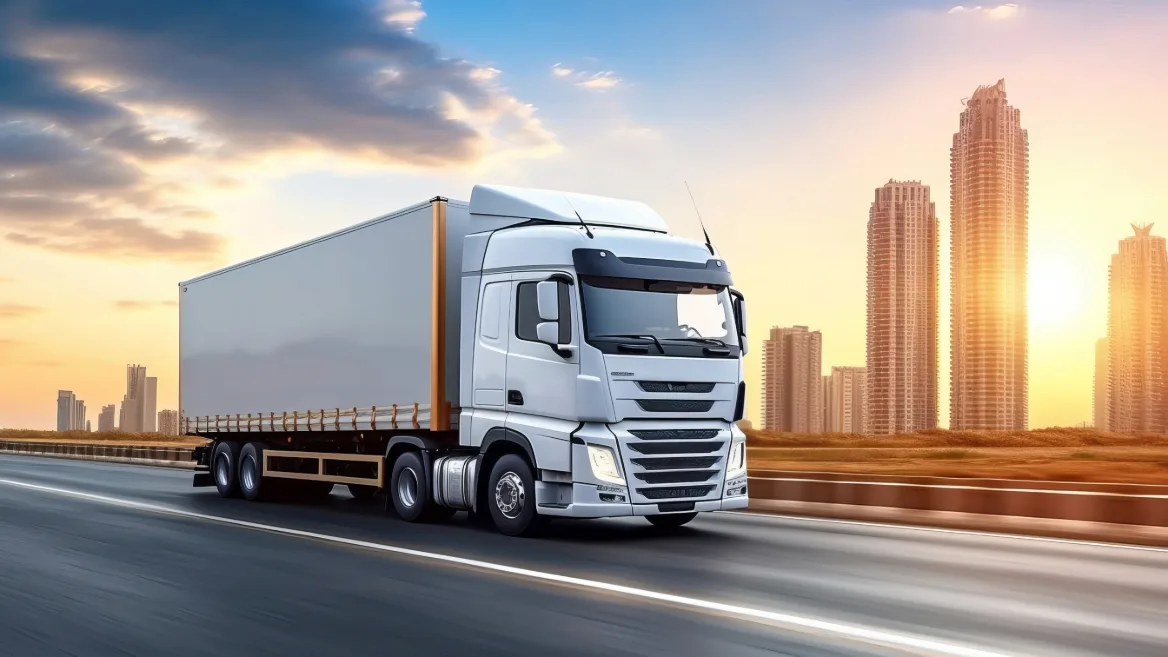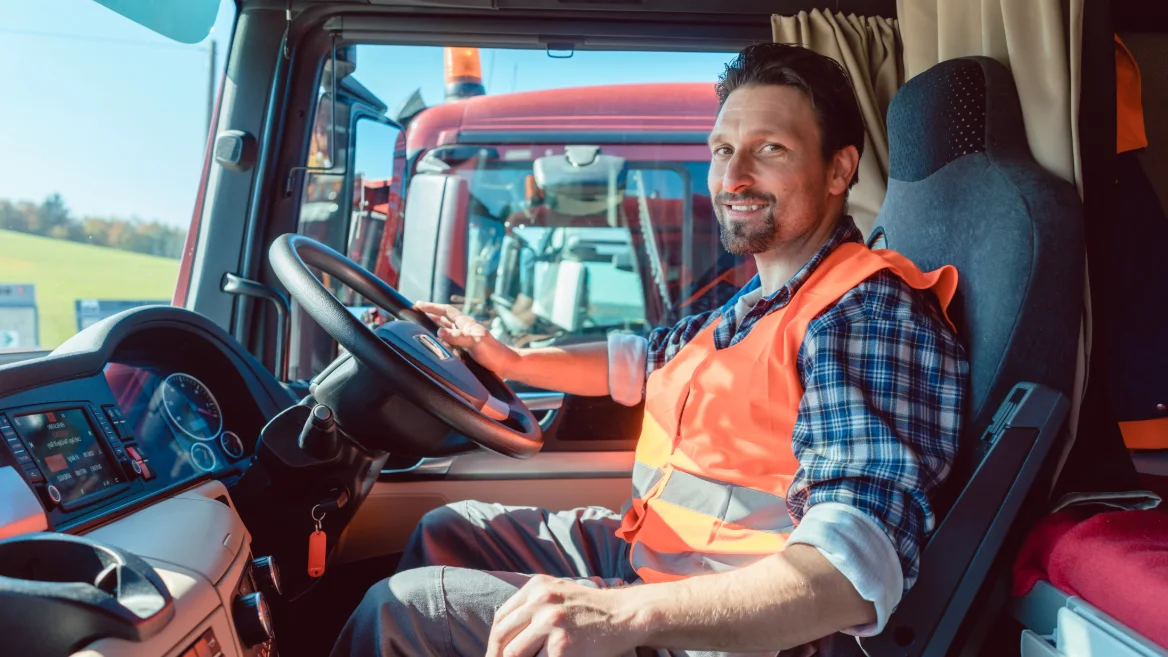Expanding into ADR services allows haulage companies to transport dangerous goods while opening doors to specialist customers. ADR (European Agreement on Dangerous Goods by Road) sets the rules for safely handling hazardous materials, and businesses need a qualified DGSA (Dangerous Goods Safety Adviser) to comply with these regulations.
If you’re a haulage company looking to expand into specialist logistics, ADR haulage could be the next step. ADR transport allows you to legally and safely move dangerous goods like flammable liquids, toxic substances, and more.
This guide breaks down the legal requirements, training, vehicle prep, and marketing tactics to help you succeed in the ADR haulage industry.
What we’ll cover
What is ADR transport?
ADR stands for the European Agreement concerning the International Carriage of Dangerous Goods by Road. It establishes strict rules for transporting hazardous materials to keep drivers, customers, and the public safe.
ADR freight includes a wide range of dangerous goods. Common examples include:
- Flammable liquids: Petrol, diesel, solvents.
- Corrosive substances: Acids, alkalis, cleaning agents.
- Gases: Propane, butane, industrial oxygen.
- Explosives: Fireworks, ammunition.
- Toxic materials: Pesticides, pharmaceutical waste.
- Radioactive materials: Medical isotopes.
- Lithium batteries: Including damaged or defective units, which now have stricter packaging and handling rules under ADR 2025.
Transporting these goods requires specialised handling, correct packaging, ADR documentation and compliant vehicles. Even small errors—like incorrect labels, missing paperwork or incompatible load combinations—can lead to delays during DVSA inspections or fines.
Demand for ADR and high-risk freight transport continues to grow across chemicals, pharmaceuticals, waste, energy and manufacturing, making ADR capability a valuable addition for many operators.
ADR classifications explained
Under ADR, dangerous goods are divided into nine classes based on the primary risks they pose.
Understanding these classifications is essential for fleet preparation, driver training, and compliance.
Class 1: Explosives
Includes fireworks, ammunition, and blasting agents. These are split into six divisions depending on their explosive potential, from mass explosion hazards to very insensitive detonating articles. Strict handling, labelling and compatibility rules apply.
Class 2: Gases
Covers gases stored under pressure, including flammable gases (like propane), non-flammable gases (like nitrogen), and toxic gases (like chlorine). Many are liquefied for transport and require specialist containment and ventilation due to explosion and inhalation risks.
Class 3: Flammable liquids
Includes fuels, alcohols, and solvents. These liquids emit vapours that are heavier than air and can travel along surfaces before igniting. Classification depends on their boiling point and flashpoint, with tighter restrictions on more volatile substances.
Class 4: Flammable solids, spontaneously combustible, and dangerous when wet
- 4.1: Flammable solids such as matches and desensitised explosives.
- 4.2: Materials that can ignite spontaneously in air (e.g. phosphorus).
- 4.3: Substances that react with water to release flammable gas, such as sodium.
Class 5: Oxidising agents and organic peroxides
- 5.1: Oxidisers that can intensify fires by releasing oxygen (e.g. ammonium nitrate).
- 5.2: Organic peroxides used in industrial applications, often unstable and sensitive to temperature.
Class 6: Toxic and infectious substances
- 6.1: Toxic chemicals that can cause serious harm through inhalation, skin contact, or ingestion.
- 6.2: Infectious substances containing pathogens like Ebola or Hepatitis B that pose a risk to human or animal health.
Class 7: Radioactive materials
Includes substances used in medical and research applications. While packaging is designed to shield radiation, transport must be carefully controlled to minimise exposure risks.
Class 8: Corrosive substances
Acids and alkalis that can destroy living tissue and damage materials. These are commonly used in manufacturing and cleaning industries and must be stored securely to prevent leaks or spills.
Class 9: Miscellaneous dangerous goods
Covers all other hazardous materials not included in classes 1–8. This includes environmentally hazardous substances, lithium batteries, self-inflating life rafts, and even asbestos or clinical waste.
Why offer ADR haulage services?
Specialising in ADR services can boost your revenue and position your company as a trusted provider for specialist customers.
Expand into high-value sectors
Industries like chemicals, pharmaceuticals, and fuel rely heavily on ADR-compliant transport. These sectors often require frequent, time-sensitive deliveries — making them ideal for haulage operators who can offer reliability and regulatory compliance. By adding ADR capabilities, you open the door to long-term contracts, higher-value haulage loads, and customers willing to pay premium rates for peace of mind.
Offering ADR transport also gives your business access to niche, recession-resistant markets. Even during economic downturns, sectors like healthcare and energy continue to rely on the movement of hazardous materials — helping you build operational resilience and reduce dependency on more volatile freight work.
Build trust and credibility
ADR certification isn’t just a legal requirement — it’s a powerful trust signal. For businesses moving dangerous goods, the stakes are high: poor handling can lead to environmental damage, legal liability, and reputational fallout. That’s why customers actively seek out providers with visible compliance and experience.
Being ADR-certified allows you to differentiate yourself from general haulage operators. It demonstrates that you’ve invested in driver training, vehicle safety, and compliance processes — giving customers the confidence that their goods will be transported safely, securely, and without delays.
Raise the barrier to entry
ADR haulage involves specialist training, vehicle investment, and strict compliance — which means fewer competitors are equipped to take on this kind of work. By entering this space, you raise the barrier to entry for others and carve out a competitive edge that can’t easily be replicated.
You also gain more control over pricing, as ADR transport jobs are less likely to be commoditised than standard freight. With fewer competitors bidding on specialist contracts, you’re better positioned to maintain strong margins.
Unlock additional revenue streams
ADR haulage also creates opportunities to offer value-added services, such as secure storage for hazardous goods, temperature-controlled transport, or consulting on transport compliance.
These extras can help you deepen customer relationships and increase revenue per contract.

How to prepare your fleet for ADR haulage services
Offering ADR services involves equipping your fleet and team to meet compliance standards. This preparation ensures both safety and efficiency in handling hazardous materials.
Vehicle upgrades and documentation
Vehicles used for ADR transport must carry specific equipment, which varies depending on load type and vehicle size. Typical requirements include:
- Fire extinguishers (amount and size defined by ADR chapter 8.1)
- Wheel chocks
- High-visibility clothing
- Respiratory protection and gloves
- Eye-wash solution
- ADR signage (orange plates and placards, where required)
- Emergency instructions in writing (paper or digital, as permitted under ADR 2025)
- Approved containment or securing systems for the goods carried
Vehicles must undergo regular checks to remain compliant. Documentation also needs to be accurate, complete and accessible for DVSA inspections.
If your fleet requires ADR-compliant upgrades or replacements, HGV finance and leasing can help spread the cost while maintaining predictable cash flow.
Courier vans for ADR transport
Courier vans can be used for ADR transport, but only in specific circumstances:
- Light vans may carry ADR goods within small load thresholds under the 1.1.3.6 “1000-point rule”.
- Full ADR requirements still apply for labelling, securing the load and documentation.
- A driver may not require full ADR vocational training for some small loads, but the company still needs a DGSA.
- For higher-risk classes, or loads exceeding thresholds, full ADR vehicle equipment and training become mandatory.
Expanding this section helps ensure van operators understand when ADR applies and avoid accidental non-compliance.
Driver training
Drivers transporting dangerous goods must complete ADR training relevant to the classes they carry. ADR training counts towards driver CPC hours.
The previous availability of widespread government-funded ADR training schemes has ended. Funding is currently available only through limited or regional programmes, so operators should check up-to-date options.
Ongoing HGV driver training is essential to keep drivers current on regulations, emergency procedures and best practice.
UK domestic rules: CDG 2009 and derogations
ADR governs international road transport, but UK operators must also comply with:
- The Carriage of Dangerous Goods and Use of Transportable Pressure Equipment Regulations 2009 (CDG 2009)
- UK-specific derogations issued by the Department for Transport
- DVSA enforcement and roadside inspection powers
This means ADR and domestic regulations must be followed together. In practice, CDG mirrors ADR closely but introduces UK-specific requirements on training, security and some waste movements.
DVSA enforcement priorities
DVSA officers regularly inspect ADR vehicles. Current enforcement priorities include:
- Correct documentation, including transport documents and emergency instructions
- Proper packaging, marking and UN labelling
- Orange plates and placards displayed correctly when required
- Vehicle safety equipment present and in good condition
- Lithium battery consignments packaged and declared according to ADR 2025 rules
- Driver understanding of emergency procedures
Preparing your drivers and vehicles for these checks reduces disruption and builds confidence with customers.
Don’t forget about insurance
When transporting dangerous goods, having the right insurance is important.
Standard haulage insurance policies may not cover all ADR risks, so it’s important to check your cover and understand what’s required.
How to market your ADR haulage services
Once your business is equipped for ADR transport, effective marketing is key to attracting the right customers.
Many industries depend on reliable dangerous goods transport, and showcasing your capabilities can set you apart from competitors.
Highlight your qualifications
Make your ADR compliance a core message in your marketing. Include:
- ADR-certified drivers
- Vehicle capabilities
- The expertise of your DGSA
- Evidence of safety and compliance processes
Showcasing case studies and testimonials is also valuable when approaching customers handling hazardous materials.
Include these details in your website content, email campaigns and proposals. They demonstrate capability and help you appear in searches for dangerous goods transport.
Reach out to specialist customers
To attract high-value contracts, focus your efforts on industries that frequently require ADR haulage services, such as chemicals, pharmaceuticals, and fuel. Networking at industry events and joining organisations like the UK Warehousing Association or Freight Transport Association can help you connect with potential customers.
Digital platforms also play a big role in expanding your reach. Haulage Exchange allows you to find and bid on haulage loads that include dangerous goods transport. With access to a wide network of ADR transport jobs, you can quickly fill gaps in your schedule and build relationships with specialist customers.
Leverage partnerships
Collaborating with established businesses in related industries can also help grow your ADR haulage services. F
or example, partnering with haulage companies or logistics firms that need additional ADR capacity allows you to access new customers without spending heavily on advertising.
The role of a DGSA in ADR services
A Dangerous Goods Safety Adviser is a legal requirement for nearly all businesses involved in dangerous goods transport, including those who pack, load, fill or unload. Their role is essential to compliance.
What does a DGSA do?
A DGSA helps ensure compliance with ADR and CDG 2009 by:
- Conducting driver risk assessments
- Maintaining compliance and training records
- Monitoring packaging, labelling and documentation
- Preparing incident reports
- Advising on vehicle equipment requirements
- Supporting drivers and transport managers
They play a key role in training drivers, ensuring your operations meet legal standards and reducing the risk of incidents.
Hiring a DGSA
Operators can:
- Employ an internal DGSA
- Use an external consultant
Smaller haulage businesses often prefer outsourcing because it is more cost-effective and flexible.
Why a DGSA matters
A DGSA protects your business from fines, legal issues and reputational harm by ensuring safe and compliant operations.
Their oversight also provides customers with reassurance about the safe handling of their goods.
How to balance compliance with profitability
Offering ADR haulage services comes with added responsibilities and costs, but the potential for higher margins makes it a worthwhile investment. The key to success lies in managing these costs while setting rates that reflect the value of your specialised services.
Manage your costs effectively
Budgeting is important when planning your ADR operations. Make sure you allocate funds for training drivers, upgrading vehicles, and covering DGSA fees. These upfront costs can feel daunting, but they’re necessary to meet legal requirements and maintain customer trust.
Effective haulage driver management also plays a big role in cost control. Proper scheduling and workload distribution help avoid overtime and reduce vehicle wear and tear. Similarly, using route optimisation tools can lower fuel consumption and minimise time on the road.
Subcontracting during peak periods or for specific jobs is another way to cut expenses. Platforms like Haulage Exchange allow you to access ADR-certified subcontractors when needed, so you can scale up without committing to full-time resources.
Set competitive rates
Specialist services like ADR transport justify higher rates, but pricing them correctly requires careful consideration. Customers value the expertise and safety you bring to dangerous goods transport, so don’t undersell your services.
Transparency is key when discussing costs with customers. Break down the factors influencing your pricing—such as compliance costs, specialised training, and vehicle upgrades—to demonstrate the value you offer.
At the same time, monitor market rates to ensure you remain competitive. Tools like Haulage Exchange’s price insights can help you strike the right balance, ensuring your rates reflect both the quality of your service and the realities of the market.
By managing your costs carefully and pricing your services appropriately, you can make ADR haulage a profitable and sustainable part of your business.
Frequently asked questions about ADR transport
What does ADR mean in haulage?
ADR stands for the European Agreement concerning the International Carriage of Dangerous Goods by Road. It sets out the safety regulations for transporting hazardous goods by road.
Do I need a special licence for ADR haulage?
Yes. Drivers need ADR training and certification to legally carry dangerous goods. Businesses may also need a DGSA to oversee compliance.
What vehicles can be used for ADR transport?
ADR transport can be carried out using courier vans or HGVs that meet ADR safety standards, including correct signage, containment, and safety equipment.
How do I become ADR-certified?
ADR certification involves attending a course and passing exams on handling, transporting, and managing dangerous goods. Many courses also count towards CPC hours.
Is ADR haulage profitable?
Yes. ADR haulage allows you to serve high-value industries like pharmaceuticals, chemicals, and fuel, often with higher rates than general haulage.




